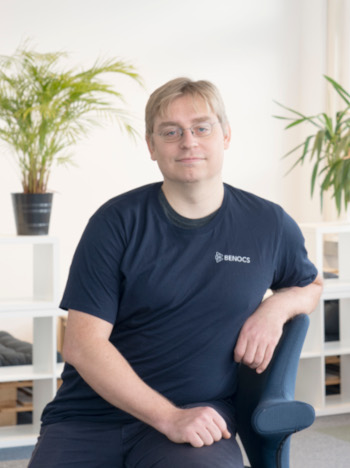It’s time to celebrate! BENOCS turns 10 years old in June. We spoke to BENOCS CTO and co-founder Ingmar Poese to learn about the early days and his experiences since co-founding the company back in 2013.
How did BENOCS come about?
Believe it or not, it was kind of an accident. At the time I was doing research at T-Labs for my PhD and they were looking for ideas for founding a company. Me & Oliver Holschke came with an idea for a business to serve large telco operators. He took care of the business side of things, while I did the technical stuff (I didn’t know much about business – and frankly. I’m still not really interested in that part).
The project was then in limbo for a year; we weren’t sure if it would take off at all. Then, in 2013, we got the go-ahead, and it was then that the company was founded conceptually. Back then the name ‘Berlin Networks Engineering’ (BNE), what we wanted to call the company, was already taken, so we couldn’t use it.
We wanted something with “Berlin” in the title, so we looked thought the available web domains for something that started with “BE”. We came across “BENOCS” and thought it sounded good.
What was the first BENOCS product and how did it look?
The product was “invisible”; it simply looked cryptic and mathematical. It was originally an ISP-CDN collaboration tool and was active in the backend only. It was designed as completely transparent, not to be seen. Kind of like IP addresses: they exist and but generally no-one thinks about them, they just work.
However, there was one crucial issue: to get enough ISPs, you need a critical mass of CDNs, and vise versa. Today we still have this product and it’s called Flow Director. I still think it has huge potential in the market. Because it’s hard to see, though, it’s hard to sell.
Incidentally, BENOCS Flow Analytics was also an accident, which happened while we were developing Flow Director. So that’s something.
What have you learned in the past 10 years about the telco industry and business in general?
The first lesson I learned about the industry is also the biggest: telcos move slowly. It’s incredibly hard to convince them of new ideas, especially for a product as close to the core as ours, which makes it almost impossible to deploy in new networks. When it does work out, though, it’s extremely rewarding for both parties. I like working with large, complex systems, and you don’t get much larger than telcos.
Regarding business in general, I’ve learned one needs to be persistent. Because you can never make each and every customer 100% happy all the time, it’s often necessary to make compromises, finding the thing that works best for the majority. Then you can build out and develop the product further from there. This requires persistence and keeping your eye on the bigger goal.
Thirdly, I learned a few interesting things about going from academia into industry. Some see you “giving up” on research. Others decide you’ve not yet gained enough industry experience. You’re stuck between a rock and a hard place; it’s a tough place to be in. For me, research still the biggest inspiration for my work.

And what have you learned about yourself?
I’ve come to realize just how much I dislike bureaucracy. Having processes in place for the sake of processes sucks. I’ve learnt that not writing code is something I don’t enjoy and unfortunately, I do a lot more of it, i.e. not writing code, than I would prefer. I’m constantly learning soft skills: my people skills have come a long way, but I’m still working on them.
And I’ve learned that if don’t stop myself, I work too much.
How do you ensure your team works healthily?
I encourage healthy working hours. I try not to contact people outside of regular working hours, unless for work-related emergencies, I try to avoid too short deadlines. That said, I also expect everyone in my team to take responsibility for themselves. If you work too much or too little, you need to tell me, so we can sort it out.
As a company we generally want to keep our employees happy and healthy. After all, our team is the secret to making the best products for the telco industry: without them, we cease to exist.
What would you do differently if you started BENOCS today, in 2023?
Building our software would be a very different process today. The technology of 2023 is different; there are many tools now available that didn’t exist 10 years ago. As a result, some technical decisions could today be made differently.
I wouldn’t do much differently regarding the team itself and building up the business. A negative experience with someone in the team at the very beginning taught me that even if a position waits longer to be filled, that is better than hiring the wrong person to do the job. As I already mentioned: each member of our team plays an integral part in keeping BENOCS running smoothly and successfully. We are very conscious of whom we take on board and whether they are the right fit for the company. We are definitely doing something right: we have a fantastic team and I am grateful that they also chose us.
The next 10 years are going to be awesome.
